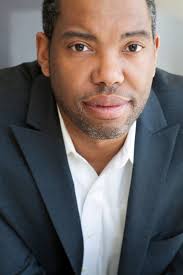
But Hiram’s gift of sight is as much about listening as it is about seeing. As he stands in the shadows of white landowners, known in the book as The Quality, he observes everything and everyone around him. And as someone who is dismissed as much more than a shadow by the delusional Quality, he becomes someone to whom people tell their stories — stories he remembers and connects to other stories, seeing a larger and larger reality take shape. He also becomes a receptacle of stories of other slaves — those known as The Tasked — and slowly pieces together the things never spoken of directly.

Ta-Nehisi Coates
Jouranlism? No. “The Water Dancer” is very much a novel — and a fantastical one at that, made more powerful because it is rooted in the real sins of slavery. The voice is nothing like that Ta-Nehisi Coates brought to “Between the World and Me,” his National Book Award-winning reported memoir on race and history, framed as a book-length letter to his son. (But then, very little of what Coates writes seems like anything else he writes, which includes new episodes of “The Black Panther” and “Captain America” for Marvel Comics, and demonstrates why he was received a MacArthur genius grant.)
Even so, the “gifts” of sight, insight, listening and remembering that Coates bestows on Hiram Walker are the gifts — or maybe just the hard, necessary work — of journalism. Thus the line that caught my notice:
“They told me their stories, gave them to me for keeping, which I did, always listening, always remembering.”
I find it impossible to read “The Water Dancer” outside the context of the racial reckonings of our times. I also think of the stories that weren’t heard or remembered through history, and how that lost space leaves us groping for understanding. It is the gift, and responsibility, of the storytellers — fiction and nonfiction — to carry those stories and share they so they can carry us forward.
